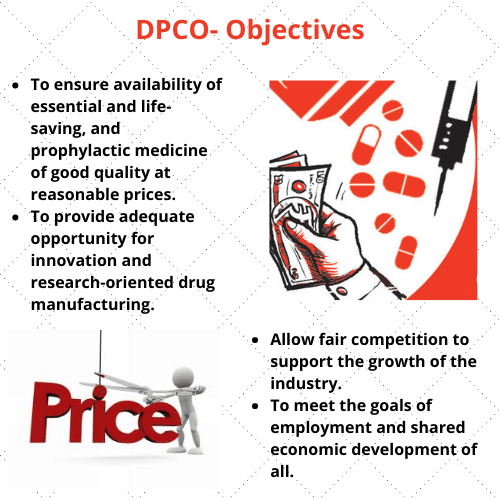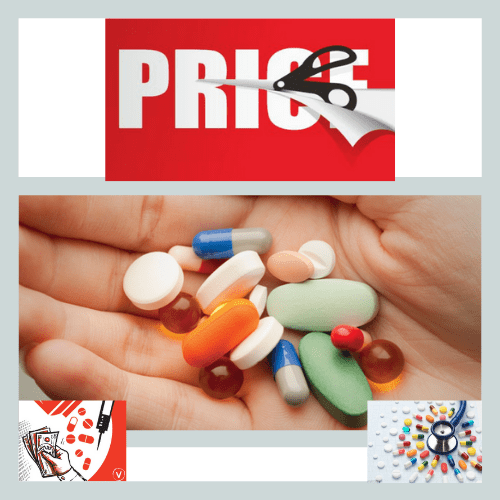National Pharmaceutical Pricing Authority is popularly known as NPPA. It is an organization (of G.O.I.) that enforces medicines’ affordable availability under the Drugs Prices Control Order (DPCO).
- Address: 3rd/5th Floor, YMCA Cultural Center Building 1, Jai Singh Road, New Delhi, India – 110001
- Contact number- +91-11-23345119
Functions of National Pharmaceutical Pricing Authority
- NPPA monitors the availability of drugs and medicines. It also identifies drug shortages, if any, and takes remedial steps.
- This body implements and enforces the Drugs (Prices Control) Order provisions.
- It collects and maintains data on the market share and profitability of individual pharmaceutical companies. NPPA also keeps a record of the production, exports, and imports of the formulations and bulk drugs.
- It deals with legal matters arising out of the decisions and provisions rendered.
- National Pharmaceutical Pricing Authority engages and conducts relevant studies regarding the pricing of drugs and pharmaceutical products.
- NPPA assists the Central Government in parliamentary matters relating to drug pricing. It also renders advice on changes/ revisions in the drug policy.
Drug Price Control Order (DPCO)
DPCO stands for the “Drug Price Control Order” (DPCO). It is an order issued by the Government of India under the “Essential Commodities Act.” DPCO ensures the affordable availability of some essential bulk drugs and their formulations.
Objectives:
- To ensure availability of essential and life-saving, and prophylactic medicine of good quality at reasonable prices.
- To provide adequate opportunity for innovation and research-oriented drug manufacturing.
- Allow fair competition to support the growth of the industry.
- To meet the goals of employment and shared economic development of all.

The main features of DPCO 2013 are:
- It brought 348 drugs and their 652 formulations under price control.
- The new policy uses a market-based pricing mechanism against the prior proposed cost-plus method.
- Margins of wholesalers and retailers have been cut down to 8% and 16%, respectively.
- To Monitor the M.R.P. of Non-scheduled formulations.
- Control over bulk drug and formulation manufacturers.
Impact of DPCO on Pharma Market:
- DPCO 2013 had a significant impact on the domestic business of the Indian Pharmaceutical industry with industry growth in M.A.T. terms decreasing growth to single digits in FY2014 from mid-double digits earlier.
- Along with low drug prices, it also resulted in trade-related issues further impacting the overall supply chain. However, the industry has recovered over the last two fiscals, with domestic M.A.T. growth at 12-13% in FY2015 and FY2016.
- Though the pharma market shows a recovery, it is compelled by volume and price growth in the non-DPCO portfolio and W.P.I. linked price growth in the DPCO portfolio.
- Pharma companies have launched new products, including non-DPCO combinations, to guard their margins alongside increased penetration to support growth.
- DPCO might also influence the decision of the R&D companies to significantly invest in the development of drugs that might come under the DPCO scanner in the future and affect scale-ups, expansions, and international quality.
- The I.P.M. growth has witnessed an unfavorable impact by price controls, with the DPCO portfolio of I.P.M. continues to perform at much slower growth than the non-DPCO portfolio. Approximately 17% of the I.P.M. is under DPCO, with DPCO drugs growing up to 7.7% F.Y. 2016 compared to 13.7% for the Non-DPCO portfolio. It has reduced the overall I.P.M. growth to 12.6% for F.Y. 2016.
- Growth- MAT March 2016 IPM: 12.6% — Non-DPCO: 13.7% DPCO: 7.7%
Impact of DPCO on Small Scale Pharmaceutical Industry:
- DPCO proved as a boon to small-scale domestic pharmaceutical industries. These companies already provide essential drugs at an affordable and reasonable price against large-scale pharma companies.
- The NPPA has put a total of 348 drugs and 652 formulations under the pricing control. These drugs remain classified as life-saving drugs- In this regard, the small domestic pharma companies with reasonable prices of medicines have benefitted as they produce generic drugs which remain significantly cheaper than their bigger brand counterparts.
- The costs of the drugs sold on a small scale instead increased, leading them to profitability.
Impact of the DPCO on the Large Scale Pharmaceutical Industry:
- On the contrary, as per the report by Indian Pharmaceutical Alliance (I.P.A.), the order made pharma companies such as Lupin, Novartis, and SUN Pharma slash the prices of their drugs by 50 to 80%.
- The reduced profitability is causing repel the big multinational pharma companies to invest in the essential drugs market.
- The reduction in ceiling prices has been formulated for more than 84% of the medicines found in India, out of which medium and large-scale pharma companies manufacture 70% of the medicines.
- Many companies discontinued popular drug brands.
- The larger-scale companies were also affected by inadequate employment generation, export growth, R&D development and expenditure, lack of new formulations, and lack of investors.
- Excessive control on price has repealed the pharmaceutical industry’s attention and slowed down respective companies’ growth.
- Implementation of DPCO led to significant losses to profit-making companies like Roche, Bayer, Novartis, and Glenmark, which lost the market because of heavy competition with generic drug suppliers and low-cost drug manufacturers Aurobindo and Lupin.
- Stringent regulation of drug prices made drug manufacturers shut down their R&D centers.
Conclusion:
- DPCO might not be a nuisance for pharma companies if rolled out with explicit provisions. It also needs to incorporate some changes and increase some benefits to companies that consider the companies’ profitability, especially those involved in innovation-driven work.
- DPCO should improve patients’ access to essential medicine and incentivize the pharma companies to invest in innovation, quality, and expansion.
References:
- About Pharmaceutical Pricing Authority
- Frequently Asked Questions regarding price control
- About price control act
- Review from ICRA article
- National List of Essential Medicines 2015
- The revised ceiling price of 866 scheduled formulations
About the author
This article is contributed by Ms. Ellen D’cunha and edited by PharmaCampus Content Editing Team.
About the author– Ellen is a passionate medical content writer and holds her bachelor’s degree in Pharmacy. She is pursuing her master’s in Pharmaceutical Management at IES MCRC Bandra. Her areas of interest include Pharma Brand Management and Digital Marketing. She routinely explores domains like Regulatory Affairs, Intellectual property rights, and Pharmacovigilance in her free time. She likes to contribute to the content marketing and social media pages of her college.

